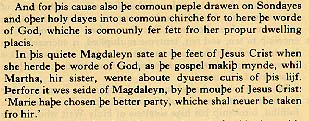 Lollard
sermon from the 4th Sunday in Lent.
Lollard
sermon from the 4th Sunday in Lent.John Wyclif and the Lollards
In the fourteenth century, John Wyclif, educated at Oxford and influenced by the nominalism of William of Ockham, gave "learned heresy" a common audience. Like the Waldensians, the Lollards translated the Bible into their vernacular language, English. The Lollards were the most significant heretical group in England before the Reformation. Interestingly, Wyclif's teachings were influential for John Hus in Bohemia, the leader of another great medieval heretical group, the Hussites. Wyclif was condemned by popes Gregory XI and Urban VI on several occasions. Even after his death, Wyclif's heretical teachings were addressed at the Council of Constance in 1415.
Followers of Wyclif came to be known as "Lollards." Perhaps the name was derived from the Dutch term lollaerd, meaning mumbler. The sect was driven out of Oxford in 1382, but some devout members circulated Wyclif's teachings as well as the 1394 "Lollard Conclusions."
 Lollard
sermon from the 4th Sunday in Lent.
Lollard
sermon from the 4th Sunday in Lent.
On Indulgences Wyclif's condemnation of the church's practice of granting indulgences.
On Sacrament of Communion Wyclif's discussion of Communion. From the Medieval Sourcebook.
On Wyclif Pope Gregory XI's reaction to Wyclif.
Lollard Conclusions Heavily circulated teachings of Wyclif.
Various Writings of Wyclif This site offers Wyclif's writings in Latin. No English translation.
New Advent This site offers a thorough overview of the Lollard movement.
Frederick Engels John Ball, and Beghards and Beguines are the subjects of this site.